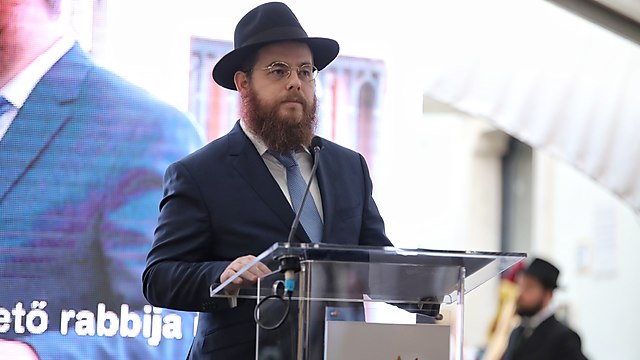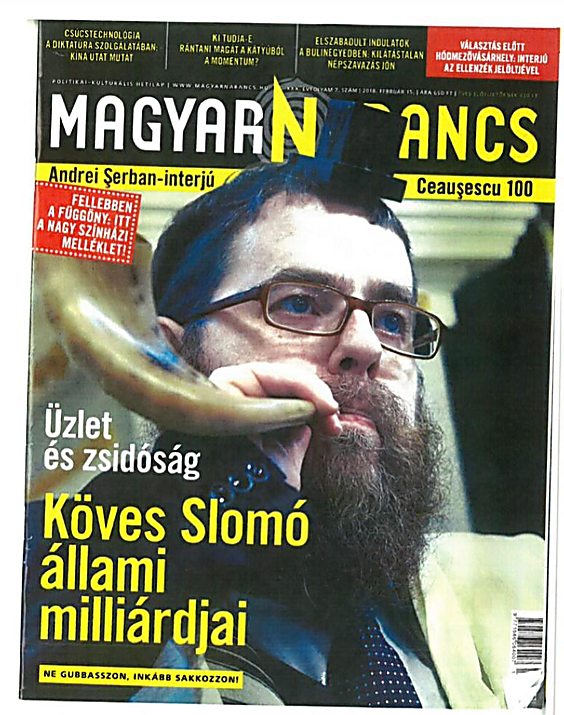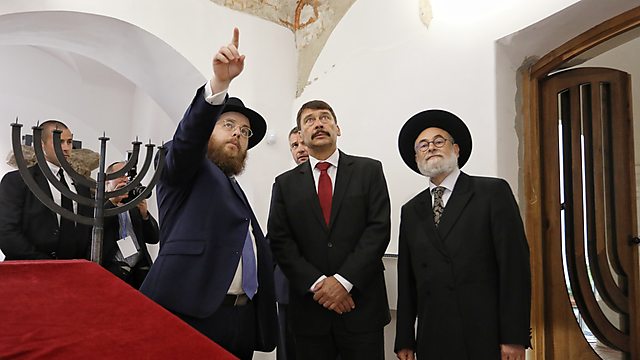
Hungary's Jews torn apart over Orban, infighting and missing money
Defending the PM and rejecting accusations of historic revisionism and collaboration with anti-Semites, Hungarian Chabad Rabbi Shlomo Koves tells Ynet that the president of local Jewish community is too keen to politicize issues.
Chabad emissary and Hungarian Rabbi Shlomo Koves finds himself at the center of a controversy surrounding the "House of Destinies"—a museum of the Holocaust and history of Hungarian Jewry with which he has been entrusted with by the government.
Last week, the president of Hungary's Jewish community and vice president of the World Jewish Congress Andras Heisler harshly criticized Rabbi Koves for his association with the Hungarian government, which he says is trying to "whitewash" its role in the murder of Jews during the Holocaust and "to rewrite history."
Prime Minister Benjamin Netanyahu even sent his political advisor Reuven Ezer in an attempt to bridge the gap between Koves and Heisler, but with no success.
But Heisler is not willing to cooperate with Koves or historian Maria Schmidt. As far as he's concerned, Hungarian Prime Minister Viktor Orbán, Schmidt and Koves are working together to "rewrite history."
Last week, Figyelo (warning), a Hungarian magazine associated with Orbán, published a picture of Heisler on its cover surrounded by bank notes. The article raised serious allegations of financial irregularities under the management of Heisler, referring to the 10 million euros that the Jewish community received from the Hungarian government to renovate the Rumbach Street Synagogue and turn it into a museum of coexistence. In Israel and in the Jewish world, the magazine cover was strongly condemned and is considered to be an anti-Semitic attack. Heisler vehemently denies any financial irregularities.
"I found it unpleasant to see Andras Heisler on the cover of the magazine, surrounded by banknotes," Koves told Ynet. "I too have experienced similar coverage (when I appeared on the cover) with a shofar and the title: 'Judaism and business, the billions of Rabbi Koves,' I condemn this cover, but not as an anti-Semitic act, but rather for misleading the public."
Koves said that the missing money earmarked for the synagogue could be a true trigger for anti-Jewish attacks.
"We can shout anti-Semitism, but when you do not answer where the funds intended to renovate the synagogue went, it could really cause anti-Semitism," said Koves. "I do not believe that the cover of him was anti-Semitic, just as I did not think that my cover was anti-Semitic. Hungarian Jews are part of society and we must take into account that we are subject to criticism and questions will be asked of us."
'Political Leadership'
Rabbi Shlomo Koves is the rabbi of the Orthodox Union of Jewish Federations congregation, numbering several thousand members, as well as the rabbi of the oldest synagogue in Hungary. But in an interview with Ynet, Heisler attacked Koves, claiming that Chabad itself has only been in Hungary for 15 years and has no expertise in establishing a Holocaust museum.
"In 2010, the left in Hungary suffered a severe blow and fell apart. Many of the representatives on the left who lost their livelihood found refuge within the leadership of the Jewish community as advisers and members of the leadership," says Koves. "It is extremely unfortunate to say this, but they have commercialized anti-Semitism and Judaism. Threfore, the candidacy of Heisler has recently become political, as in against Orbán's government."
"It's not only the involvement of the Jewish community in politics in Hungary, but also in politics in Israel. Unfortunately, they portray anti-Israel traits. One of their (the left's) rabbis, Geber Finály, said that Israel is like North Korea, and Heisler did not condemn his words. Now they are trying to blend it together with politics in Israel and turn the whole thing into a kind of struggle between the left and the right, between the Foreign Ministry and the Prime Minister's Office. It is a mistake and a travesty."
'I am the historian, he sells clothing'
The claims of anti-Semitism upset Koves: "If there is something that causes anti-Semitism, it is the fact that they have become so political," he says. The magazine that put Heisler on the cover asked him a number of questions and instead of responding, he boycotted and accused them of anti-Semitism.
"The reporter asked them how exactly they used the government funds, whether there was a concept for the museum and who is working on the museum? These are questions that the public deserves answered," said Koves.
Is Orbán good for Hungarian Jews?
"Orbán is trying to uproot anti-Semitism from the right-wing identity in Hungary. Anyone who knows Hungarian history knows that part of the right-wing identity is anti-Semitism, and he is trying to cleanse it by openly standing by Israel, worrying about Jewish life, and making statements that support Israel and the Jewish community. So I believe that he is a positive leader."
A CNN survey found that about 20% of Hungarians identified themselves as anti-Semites, which is quite high.
"The survey is indeed shocking, but the rate of anti-Semitism in all western countries, including the United States, is at 40 percent, and Hungary is among them, to my great regret. What is different here is the number of people who openly identify as such, as well as the lack of knowledge about Jews in Hungary.
"This is precisely the reason why we should work to establish a Holocaust museum that will tell the Jewish story and convey knowledge to people who have no connection to Judaism and Israel. It can change the mindset of an entire generation toward the Holocaust, the Jews and Israel. The government already agreed that control of the museum should be in Jewish hands, Chabad, and we have the authorization to implement a new concept.
"We are in the midst of discussions with a number of historians who are working on it, and instead of strengthening it and cooperating, they are again turning it into a political matter. This is a serious mistake that reinforces anti-Semitism."
Heisler claims that Chabad lacks historical knowledge, local roots as well as archives like that of the general community.
"Between the two of us, I am the historian, he sells clothes. No one has said that I am going to be creating the contents of the museum. There is already a series of Israeli and American historians and professionals working on it… Heisler is turning it into a political matter and portrays me as a traitor and other accusations that I did not respond to because I am not interested in turning it into something personal."
What do you say about the involvement of the Israeli government?
"The Israeli government is acting very wisely because by not getting involved in the content itself. They themselves declare that only established international historians should be responsible for the content… Reports that Israel is involved in planning the museum's content are simply false."
They claim that you are helping 'whitewash' the problematic past of Hungary.
"I am a grandson of Holocaust survivors and I live here in Hungary, how can I be blamed for this? I would not lend my name to even the slightest bit of revisionism. History cannot be rewritten, including the issue of the Hungarian government during the Holocaust.
"There is no doubt that the murder of Hungarian Jews after 1944—with the German invasion—was in full cooperation with the administration at the time, headed by (Miklós) Horthy."
















